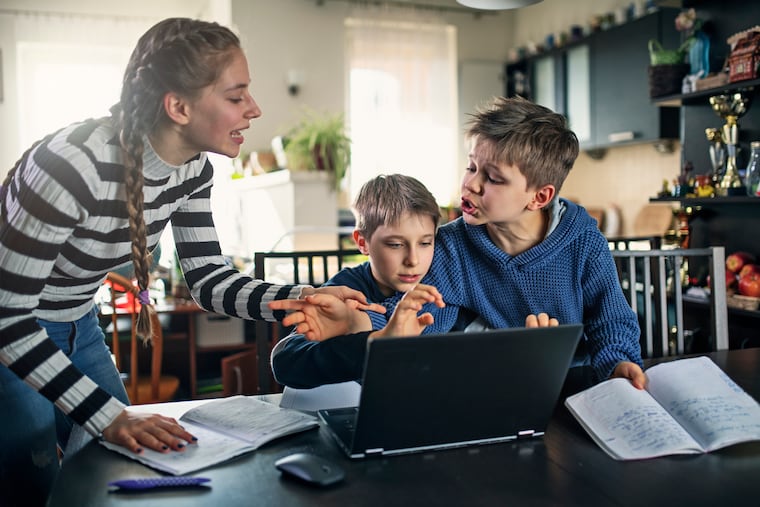Tips to help parents cope during school closures
Experts share evidence-based parenting tips for getting through the school year at home.

The days are blending into weeks and months as we shelter in place, and people are experiencing a range of emotions including anxiety, boredom, and grief.
The announcement from Gov. Tom Wolf that Pennsylvania schools are closed through the end of the academic year solidifies the reality that we will need to navigate parenting, home-school, and professional obligations for at least an additional several months.
Here are a few evidence-based parenting tips for getting through the end of the school year at home:
1. Explain what’s going on
Explain to your kids what is going on in a developmentally appropriate way. For example, when Melanie’s almost 3-year-old asks whether she is going to school, she says, “No one is going to school right now. We’re trying to keep everyone healthy, and we can help by not going to school for a bit.”
For older kids, like Rinad’s almost 7-year-old, she explains social distancing and how keeping schools closed will reduce the spread of this disease, especially for higher-risk populations such as grandparents. We have also used the NPR COVID-19 cartoon to help explain the situation to preteens. For teens who are missing such important milestones as graduation and prom, allow time to grieve if they are feeling sad about these changes.
The most important thing to emphasize for kids of all ages is that school closure is one way that we can keep everyone safe.
2. ‘Let it go’
A quote from both of our daughters’ favorite movie, Frozen — let everything go that you can. This is not the time to start enforcing new rules or even enforce old rules that aren’t that important. In our houses right now, keeping the kids safe is the only rule we are enforcing. This is how chocolate chip pancakes became a daily breakfast for Melanie’s family and how Rinad’s kids are enjoying more screen time than they are usually allowed.
With schools closed, there is a new expectation that parents are “teachers,” too. This is not necessarily the time to take on this new career so just do the best that you can. Talk to teachers if you can’t meet the expectations that they are asking for. Now is the time to embrace “good enough” parenting. For example, Rinad’s 4-year-old does not enjoy sitting still during Zoom meetings with her class. She is managing this by signing into Zoom but not forcing her daughter to sit still to avoid unnecessary fights.
3. Take care of yourself
Healthy parents make healthy kids. This is supported by extensive literature and should be at the top of every parent’s priority list. Navigating multiple responsibilities such as continuing to work remotely while also needing to home-school can be very difficult for both your physical and mental health. If you have a partner in the home, block off some time to yourselves each day. If you don’t have a partner in the home, identify what keeps your little ones most occupied so you can have your own time.
Take a bath, go on a walk, make and eat an entire batch of brownies, try a mindfulness video, or access one of the many free classes Philly fitness studios are live-streaming. If you want to read a book to reduce your anxiety, let your kids watch TV or do whatever keeps them occupied. It’s fine! Remember that it is not sustainable to be 100% in your multiple roles.
4. Limit your news
Try not to be glued to the news. For most people it only serves to increase anxiety. Decide how long you need to consume the news each day, such as a 10-minute daily news update, and try your best to stick to the schedule. If your teens want to look at the news themselves, try watching or reading with them. Model how to find reputable sources and limit the amount of time spent looking at the news.
5. Do something good
Doing something for others can help you feel better, give your family something to do, and model for your kids how to help others during a crisis. That is a key component of social emotional learning, so you can feel good that you are teaching your kids a very valuable life skill. Kids can send cards to people and call family members to check in. You can offer to get groceries for a neighbor, donate blood (we currently have a severe shortage), make signs thanking health-care workers and display them in your window, or use your own skills in unique ways —such as Melanie’s husband, who has been using his tech skills to connect people on Reddit to help.
6. Take it one moment at a time
Remember, each day is one series of moments. If today was hard, try to problem-solve to make tomorrow easier. Focus on things that are within your control and accept the things that are not. It helps to try to find the silver lining, such as spending more time together as a family.
Melanie Klein is a child psychologist completing her postdoctoral fellowship at the Center for Mental Health in the Perelman School of Medicine at the University of Pennsylvania. Rinad Beidas is a child clinical psychologist and an associate professor in the department of psychiatry at the Perelman School of Medicine.